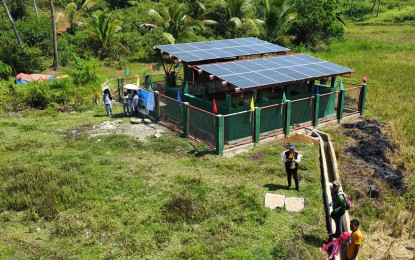
SOLAR-POWERED. A solar-powered irrigation facility is turned over by the government to rice farmers in the island village of Opong in Taganaan, Surigao del Norte on Sept. 7, 2023. President Ferdinand R. Marcos Jr. said Saturday (Feb. 3, 2024) that his administration is eyeing more solar-powered irrigation projects to boost the production of palay in the country. (Photo courtesy of NIA-13)
MANILA – The government is eyeing more solar-powered irrigation projects to boost the production of palay (unhusked rice) in the country, President Ferdinand R. Marcos Jr. said on Saturday.
During the ceremonial harvest of palay and distribution of various assistance to farmers and farmers’ cooperatives and associations (FCAs) in Candaba, Pampanga, Marcos said the project aims to provide reliable irrigation water supply to more or less 180,000 hectares of agricultural land nationwide.
He said the plan is projected to produce 1.2 million metric tons (MT) of palay output.
“Ang susi talaga diyan ay ‘yung patubig, kaya’t tinitignan po namin ‘yung sistema na ginagawa, at palagay ko susubukan natin ‘yung solar-powered irrigation (The key is irrigation, so we are looking at the system that is being developed, and I think we will try solar-powered irrigation),” he said.
“Iyan po ang ating mga pina-plano upang pagandahin pa ang sitwasyon natin sa sektor ng agrikultura. Patuloy nating palakasin at pag-ibayuhin ang mga tulong para sa mga apektadong lugar at mga mamamayan (That' is our plan to improve our situation in the agricultural sector. We will continue to strengthen and increase the assistance for the affected areas and citizens)."
The President said the use of solar energy is economically viable and cost-effective as it would help farmers irrigate their lands free from the burden of spending money on expensive diesel pumps.
Solar-power irrigation projects, he said, are seen as a solution to address the challenges hounding the agriculture sector, including the adverse impacts of typhoons and the El Niño phenomenon.
“Maglalagay po tayo ng solar tapos ‘yun ang gagamitin na kuryente para sa mga bomba. Tinitignan namin, makakatulong agad na ito dahil ang ini-import natin siguro mga 3.5 million (metric) tons sa bawat taon (We will install solar power to operate the pumps. We are looking at it, it will help immediately because we import maybe 3.5 million metric tons of rice every year),” Marcos said.
He also mentioned a plan to implement more small-scale irrigation projects to increase the rice supply and farmers’ income.
The government, he said, is looking for funding sources for the irrigation projects.
Palay production in 2023 reached 20.06 MT, the highest harvest of the country’s national staple, and 1.5 percent higher than the 2022 volume of 19.76 million MT, based on the data released by the Philippine Statistics Authority (PSA) in January.
The record palay harvest translates to 13.2 million MT of rice, an amount that allowed the country to reduce rice import volume to 3.5 million MT from 3.8 million MT in 2022.
New rice varieties
Marcos said the government is also focused on developing new varieties of palay that will be resilient amid the changing weather conditions in the country.
“Ilan sa mga hakbang na ginagawa natin ngayon ay ang paglikha ng mga binhing umaayon sa pabagu-bagong klima, gayun din ang pagsasagawa ng climate risk assessments para sa mga nasalantang pamayanan (Some of the steps we are currently undertaking is the development of seeds that can adapt to the changing climate, as well as the conduct of climate risk assessments for the affected communities),” he said.
“Kayong mga magsasaka, ramdam na ramdam ninyo yung tinatawag nating climate change kaya’t kailangan pag-aralan nating mabuti kung may variety na baka maaaring gamitin kapag mabagyo, kapag masyadong malakas ang ulan (You farmers can really feel what we call climate change, so we need to study carefully if there is a variety that could be used during the stormy season, when the rain is too heavy).”
Marcos also noted that the government has earmarked about PHP31 billion for this year’s implementation of the National Rice Program to improve production support, extension services, research and development, and irrigation network services.
He likewise assured farmers that they would continue to receive assistance and support from his administration.
“Sa ating mga minamahal na nagsasaka, ang inyong dedikasyon, sakripisyo, at sipag ay tunay na nagsisilbing inspirasyon sa ating lahat (To our beloved farmers, your dedication, sacrifice, and hard work truly serve as an inspiration to all of us),” he said.
“Ang ating pagtutulungan na mapaunlad ang ating sektor ng agrikultura ay isa lamang sa mga pangunahing hakbang tungo sa pagbuo ng isang Bagong Pilipinas kung saan walang nagugutom at ang lahat ay masigabong kumikilos para sa mas masaganang kinabukasan (Our cooperation to develop our agricultural sector is just one of the main steps towards building a New Philippines where no one goes hungry and everyone works hard for a more prosperous future).”
During the event, Marcos led the distribution of assistance to more than 12,000 farmers and FCAs.
These include a hauling truck, bags of certified inbred rice seeds, financial assistance, fertilizer discount vouchers, and a warehouse with a mechanical dryer. (PNA)
